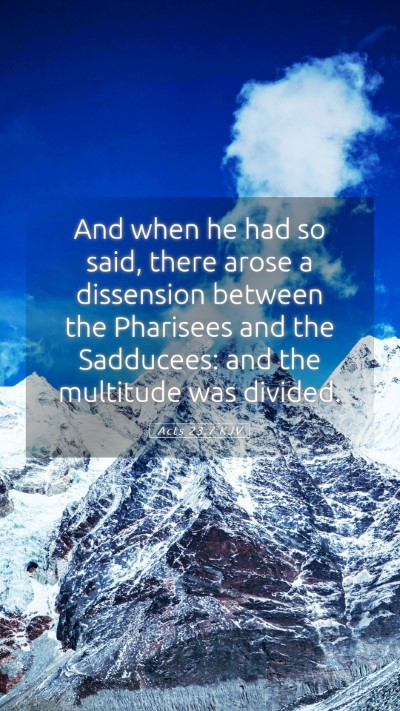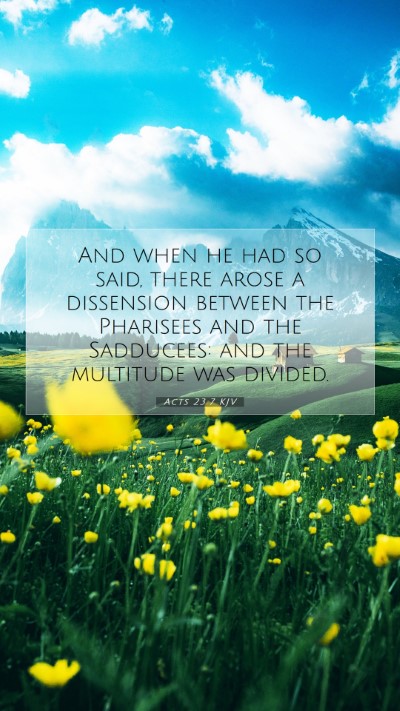Understanding Acts 23:7: A Comprehensive Bible Verse Commentary
The Bible verse Acts 23:7 states:
“And when he had said this, there arose a dissension between the Pharisees and the Sadducees: and the multitude was divided.”
This verse provides insight into a significant moment in the Apostle Paul’s defense, highlighting tensions between differing religious factions. Gathered from public domain commentaries, let’s delve into the meaning, interpretations, and applications of this verse for modern readers.
Bible Verse Meanings
Acts 23:7 reveals the beginnings of a debate that Paul ignited by declaring his belief in the resurrection of the dead, a pivotal issue that separated the Pharisees, who believed in resurrection, from the Sadducees, who did not. Understanding this verse requires exploring its historical context, the theological implications, and the personal motivations behind Paul’s statement.
Scripture Analysis
- Paul's Strategy: Paul cleverly uses the existing divide among the Jewish leaders to his advantage, drawing attention away from himself and redirecting the conflict towards ideological differences. This demonstrates his wisdom in handling opposition.
- Theological Significance: The resurrection is a central theme in Christian beliefs and is crucial to understanding the New Testament's message. Paul expertly raises this issue, reminding listeners of its theological implications.
Bible Verse Interpretations
- Matthew Henry: Henry emphasizes the significance of unity and division within religious contexts. He explains that divisions, like those between the Pharisees and Sadducees, can reveal deeper truths about theological beliefs and challenges.
- Albert Barnes: Barnes discusses the political and religious climate of the time, arguing that Paul's mention of resurrection highlights the tension and competition between these two groups, which is crucial for understanding early Christian evangelism.
- Adam Clarke: Clarke elaborates on the nature of the dissension and argues that Paul’s proclamation addressed both the theological beliefs and the power struggles of that era. He highlights the importance of understanding scripture in the context of history and society.
Bible Study Insights
- This verse prompts readers to reflect on how differing beliefs can influence relationships and conflicts within communities today.
- It serves as a reminder of the importance of doctrinal foundations in interpreting scripture and understanding its implications for living out one’s faith.
Application of Acts 23:7
How can Christ followers apply the lessons from Acts 23:7 in their lives?
- Engagement in Dialogue: Just as Paul engaged in dialogue that highlighted theological divides, Christians today can learn to enter into respectful discussions about faith while standing firm in their beliefs.
- Understanding Differences: Recognizing varying theological perspectives can enhance personal faith journeys and contribute positively to group dynamics in Bible study groups.
Related Bible Verses
- Acts 24:21: Similar themes of resurrection arise in this subsequent passage where Paul is further questioned about his beliefs.
- Luke 20:27: Here, Jesus encounters the Sadducees and alludes to resurrection, setting a foundational understanding that relates to Acts 23.
- John 11:25-26: Jesus speaks about the resurrection and life, showcasing the crux of Paul’s argument in Acts 23:7.
Conclusion
Acts 23:7 serves as a profound reminder of the challenges faced by early Christians and underscores the necessity for theological clarity amidst division. By examining this verse, readers can gain valuable Bible verse interpretations and insights into the nature of faith, conflict, and the importance of understanding scripture in its full context.
Further Study Resources
For deeper engagement, consider leveraging various bible study tools and bible study guides that focus on Acts and Pauline letters. Understanding difficult Bible passages is essential for both personal faith and community discussions.


